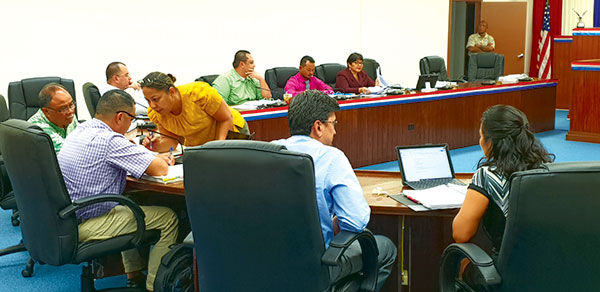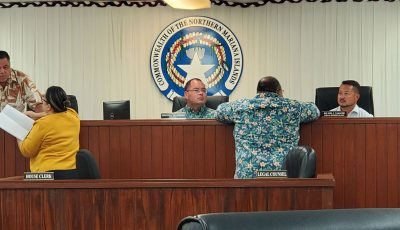House mulls overriding budget vetoes

House Clerk Linda Muña approaches House floor leader pro tem Rep. Ralph Yumul (R-Saipan) for a clarification during the House session last Tuesday afternoon. (ERWIN ENCINARES)
The House of Representatives would be discussing at a Monday session the budget vetoes of Gov. Ralph DLG Torres on the fiscal year 2020 budget, with the goal of either clarifying some housekeeping matters or even overriding some of those vetoes.
In last Tuesday’s House session, Rep. Ivan A. Blanco (R-Saipan) asked House speaker pro tem John Paul Sablan (R-Saipan) to keep on the House’s agenda the governor’s message informing the House that he had enacted Public Law 21-8, or the fiscal year 2020 budget bill, for discussion in their session this Monday.
He noted that there might have been a misunderstanding pertaining to the governor’s veto of Section 710(k) of House Bill 21-64, HD2, SD1, which states that the Executive Branch will pay for the Group Health and Life Insurance expenses of the Legislature’s and Judiciary’s employees.
Blanco noted that previous letters from the Office of Management and Budget, which is under the Governor’s Office, had stated that the Executive Branch would take care of the GHLI expenses.
“…We had received email communication and verbal assurance from OMB during the budget process that…the Executive Branch will include those payments in their budget allocation,” he told Saipan Tribune.
“…I requested speaker pro tem John Paul Sablan to [put] the governor’s veto message on our calendar to discuss the matter, and discuss avenues to resolve the matter at the earliest possible time,” Blanco said. “I understand there might have been a miscommunication…and I want to stress that the Legislature is going to work with the Judiciary and especially the Executive Branch to resolve this matter at the soonest.”
If no resolution is reached on this matter, Blanco said he might even consider asking the Legislature to override the governor’s veto.
In order to do that, the motion to override must be supported by at least two-thirds of both the House and Senate. With 20 members in the House and nine members in the Senate, a veto must garner at least 19 votes from both chambers to take effect.
Rep. Tina Sablan (Ind-Saipan) supports discussing the governor’s veto anew.
“…It’s very much a concern for our [CNMI] employees that [GHLI expenses] have been line-item vetoed. We definitely need some clarity. …There seems to be some disconnect in the administration, and we should really get to the bottom of that,” she said.
Sablan noted that the possibility of introducing a new bill mandating the Executive Branch to pay for the GHLI expenses is a possibility, but “given that we are already two weeks into fiscal year 2020 and noting the urgency of the issue, a veto might be the most efficient and expeditious route.”
Reporting requirement
The budget bill, H.B. 21-64, HD2, SD1 had also set stricter and more frequent reporting requirements for the Finance secretary. However, in the governor’s Sept. 26, 2019, transmittal letter, he also vetoed that particular section and Sablan believes the more onerous reporting requirements were necessary.
“This Legislature did insert more reporting requirements on top of what would normally be imposed in previous budget acts, but…we have been requesting for information from this administration and we have not been getting the information that we need to really keep an eye on the government purse,” Sablan told Saipan Tribune.
“I believe we should consider overriding that [veto] as well,” she added.
According to Torres’ transmittal letter on the enactment of the fiscal year 2020 budget bill, he is not against imposing stricter reporting requirements on the Finance secretary but he recommends amending the Planning and Budgeting Act, instead of embedding the new requirements into the budget bill.
“My administration fully recognizes that the need for transparency and accountability is critical for the monitoring of our government’s fiscal health. Nevertheless, this monthly reporting requirement inefficiently imposes unnecessary burdens onto the secretary of Finance and his staff,” he had said.



























